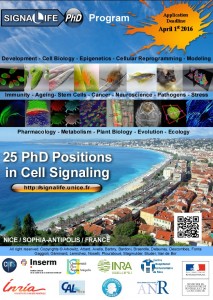
PhD Program Application from February to April 1st, 2016 (midnight)
I – Presentation
The International SIGNALIFE PhD program of the University of Nice-Sophia Antipolis is currently accepting applications for 25 targeted 3-year PhD positions, which will start in September 2016.
 The Labex (Laboratory of Excellence) SIGNALIFE is a collaborative research program in Life Sciences at the University of Nice Sophia Antipolis financed by the Excellence Initiative of the French Ministry of Research. SIGNALIFE involves the leading research laboratories of the area and supports 49 top-level research teams grouped around five major topics relating to cell signaling:
The Labex (Laboratory of Excellence) SIGNALIFE is a collaborative research program in Life Sciences at the University of Nice Sophia Antipolis financed by the Excellence Initiative of the French Ministry of Research. SIGNALIFE involves the leading research laboratories of the area and supports 49 top-level research teams grouped around five major topics relating to cell signaling:
1 – Cellular architecture of signaling pathways
2 – Plasticity and Signaling
3 – Stress Signaling
4 – Signaling in aging and disease progression
5 – New principles in signaling and applications
There are currently 50 International Labex SIGNALIFE PhD Students in our laboratories from three previous successive waves recruitments. Fourth wave successful candidates will enroll in the Graduate School of the University of Nice Sophia Antipolis (Life Sciences and Health Doctoral School). This University is a major interdisciplinary campus with over 25 000 students on the French Riviera in the South of France and has state-of-the-art facilities for biomedical and basic research.
Please note that for the 2016 PhD students’ wave, most all Labex research groups are offering PhD project(s), including collaborative projects between two teams, Labex and non-Labex. You can find the descriptions of the 2016 PhD projects here.
II – Application procedure
Candidates must have achieved academic excellence and be highly motivated to pursue a PhD project in one of the above research areas. Applicants must hold or receive, before enrollment in the program (before September 19th, 2016), a university degree that qualifies them to enter a PhD or equivalent program such as a Masters 2 diploma. A minimum of 6 months laboratory experience is essential.
The online PhD application form should be completed (see PhD application form) by April 1st, 2016 midnight. Please indicate on the form your top three choices for a PhD project you would like to apply for. You can find a description of the 2016 offered thesis projects here. In addition to the completed form, copies of diplomas and a certified transcript (including grades) of course work (in English or French, your own translation is fine for the moment) should be uploaded as a single pdf in the PhD Application Form. If you have not yet obtained your Master diploma, please send a provisional degree and grades of your current courses. Original printed copies (and official French or English translations thereof) will be asked upon acceptance to enter the program. Upon completion of the online registration you will receive a confirmation email with your SIGNALIFE registration number.
References
Please indicate the names and contact details of two referees in the application form. The selection committee will contact the referees of pre-selected candidates for references.
III – Selection procedure
Pre-selection : the SIGNALIFE selection committee will shortlist up to 3 candidates per project.
Interview/on-site visit : Selected applicants will meet the SIGNALIFE selection committee for an onsite interview and visit. Travel and accommodation costs will be covered by SIGNALIFE.
Final selection : The selection committee will rank applicants for each project. Acceptance letters will be sent to the top candidates, who will be asked to respond within 1 week.
IV – Other PhD program activities
Our program offers a comprehensive package of additional training activities throughout the duration of the thesis to provide students with a range of skills important for a successful career in science. All classes will be in English:
• Scientific communication, writing skills, grant writing, career development etc.
• Workshops
• Practical training courses in France and Europe
• Lectures given by invited scientific experts
• Summer schools
V – Deadlines for application and selection
• Applications should be filled out on line by April 1st, 2016 midnight at the latest.
• Candidate’s preselection : April, 2016
• Candidate’s on-site visit/interview: May/June, 2016
• Final ranking and acceptance letter: End-June 2016
• Student’s acceptance 1 week thereafter
• Start of PhD thesis: September 2016
VI – Thesis funding
- Duration: The PhD thesis funding is for three years. A possible 3 to 6 month extension may be offered at the end of the 3rd year.
- The arrival and installation of each student will be aided and accompanied by a dedicated PhD Program Officer, Konstanze Beck, who will provide practical, administrative and scientific advices with respect to the institutions and local authorities (i.e. lodging, visa, social security, bank account, etc.).
- Studentship: The monthly salary will be 2020€ and provides social benefits. University tuition fees will be included. An installation allowance of 1700 € upon arrival will be given to each student. Free French classes will be provided for foreigners.





















